RMIT Students bring Order to Court
The third year of the Access to Justice Through Technology stream Innovation Program produced a crop of high quality, low-cost innovative solutions that met the ultimate design thinking test that they must be desirable, feasible and viable.
Question: How do you begin solving the problems of chaos in our courts, improving the effectiveness of volunteer legal services and reducing the over-representation of people with an acquired brain injury (ABI) in the prison system?
Answer: By bringing together 21 talented students from a range of disciplines across RMIT University, matching them with legal mentors, industry partners and leaders in the use of design thinking and then giving them a 13-week deadline to come up with solutions.
Bringing order to the court
When student eyes experience our courts for the first time, they see chaos, confusion, frustration and stress. They see court staff under immense pressure, long waiting times and technology that is more ‘nology’ than tech. They see a lot of wasted time, effort and resources. In short, a system that is overwhelmed and struggling to cope with increasing demand.
Then they see possibility, the possibility of bringing order to the chaos. Four teams took on two challenges relating to our courts: Improving the co-ordination of family violence court matters, and improving duty lawyer services.
Family Violence
The team of Amanda Morglund, Kalid Elali and Santiago Perrotto, develop ‘Staq’, a case management tool that allows registry staff, police and legal aid services the ability to track in real time the priority and progress of cases. It also allows users to contribute key information and request it from others. It allows registry to triage cases by priority and affected parties to be kept informed about their cases reducing stress, frustration and bottlenecks. It involves a simple IT platform that integrates with the
Courtlink system and easy to use menus. It can operate seamlessly between tablets and PCs.
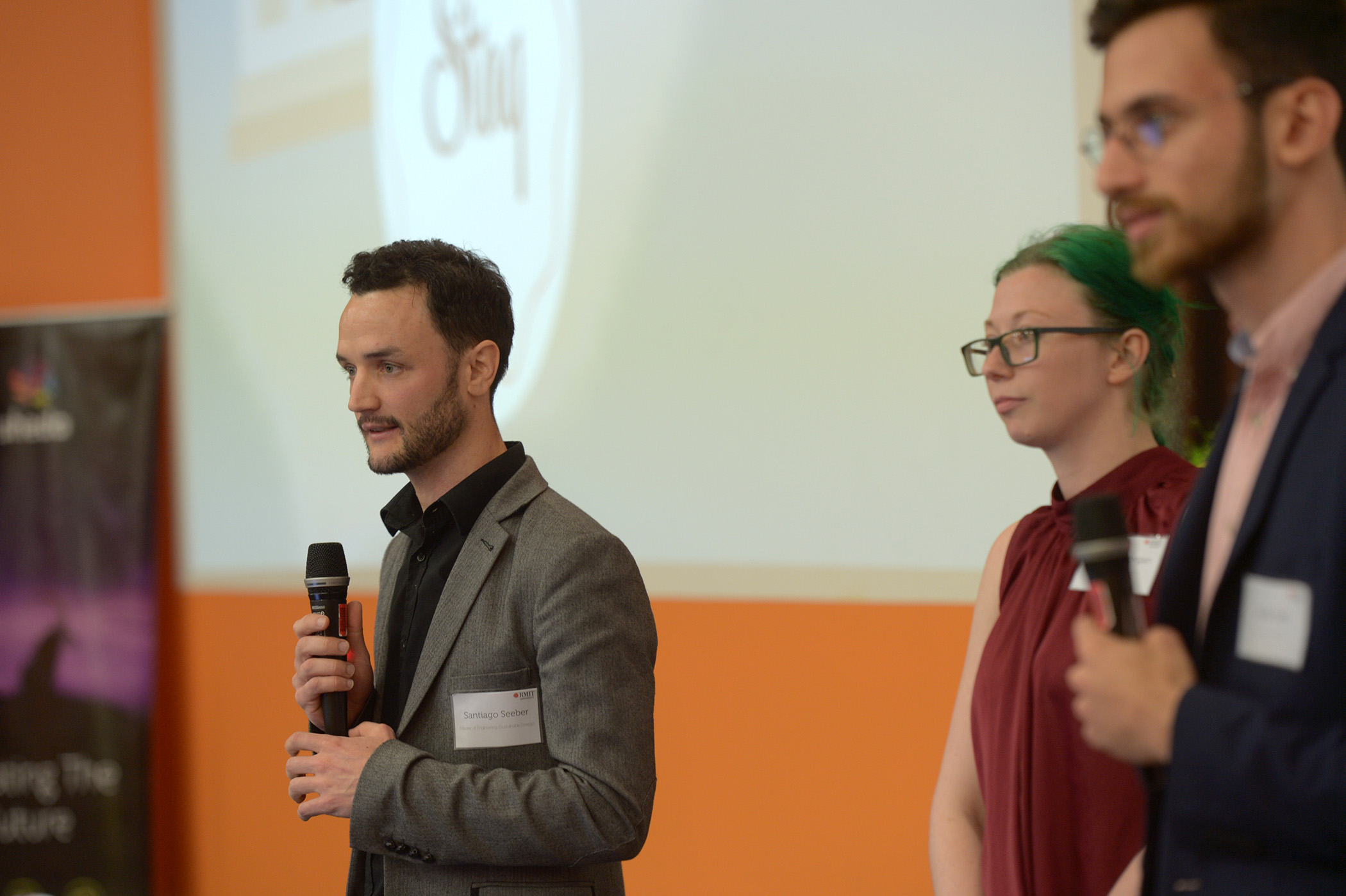
The team of Alice Gleeson, Agam Sood and Edison Yap also developed a case management system called ‘Ontrack’. This system provides a tool where all cases for the day can be compiled into one list and displayed on a dashboard, where staff and services can easily update and see the progression of cases. Both solutions deliver significant time savings for all involved, a more orderly approach to case management and subsequent reductions in stress.
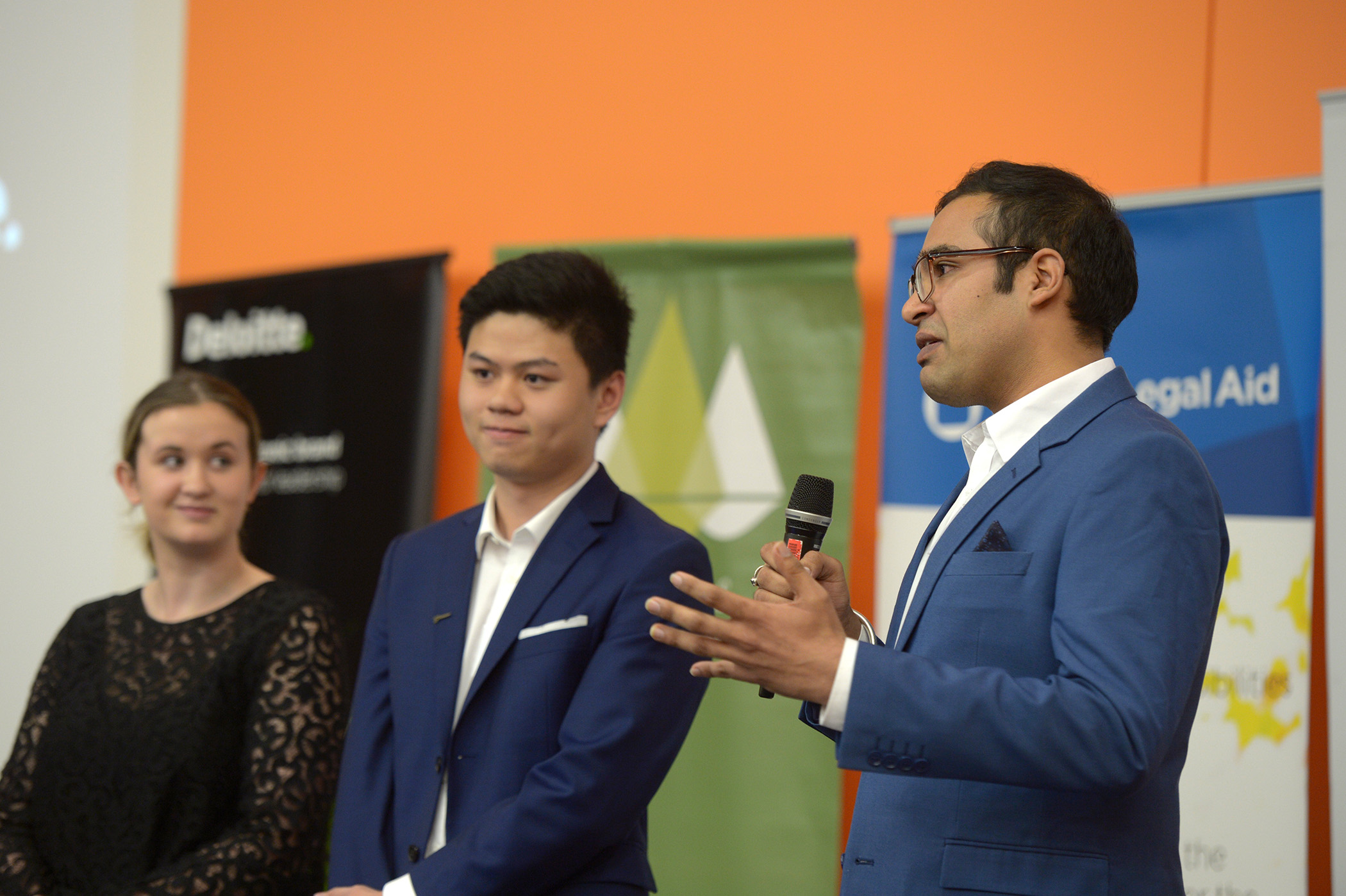
Lawyers for Duty
The team of Alima Waniganayake, Anna Rysenbry and Miriam Beuthien, saw a duty lawyer service that was inefficient, congested and chaotic, often due to circumstances seemingly beyond the lawyer’s control. The team’s low-cost intuitive solution LiveCase is designed to improve and smooth the interaction between clients, clerks and duty lawyers. In the process it delivers benefits to all: clients will be able to track the status of their cases on a publicly available screen, the interruptions experienced by clerks will be reduced and the client allocation system for duty lawyers will be improved.
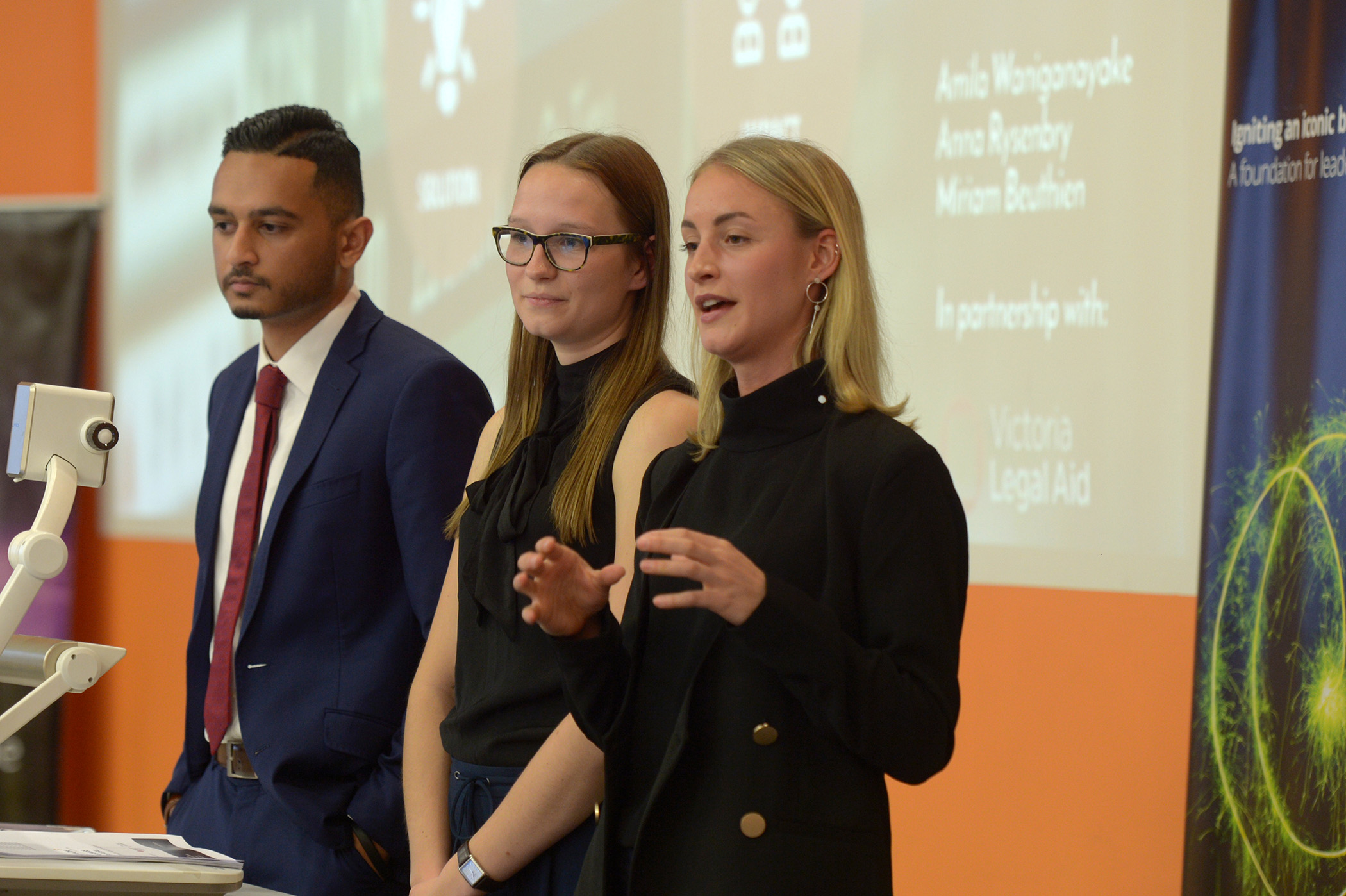
The response of the team of Ysabella (Renee) Gaspar, Vivien Shi Xian Lee and Gloria Latosa, to the outmoded and inefficient communication and escalating caseloads they saw was the Big Red Button. The team believed that the most important relationship to focus on was that between the police prosecutor and the duty lawyer. They believed that the benefits of developing greater order in that relationship and making interactions more effective and efficient, would flow onto to clients, courts staff and magistrates. The BRB is a simple calendar tool tailored to their needs that allows duty lawyers to schedule meetings with police by co-ordinating their activities. The process also includes a simple list of questions to aid decision making. The calendar provides 20-minute time slots, reminders and easy rescheduling. It can be integrated into existing calendars and runs on a tablet.
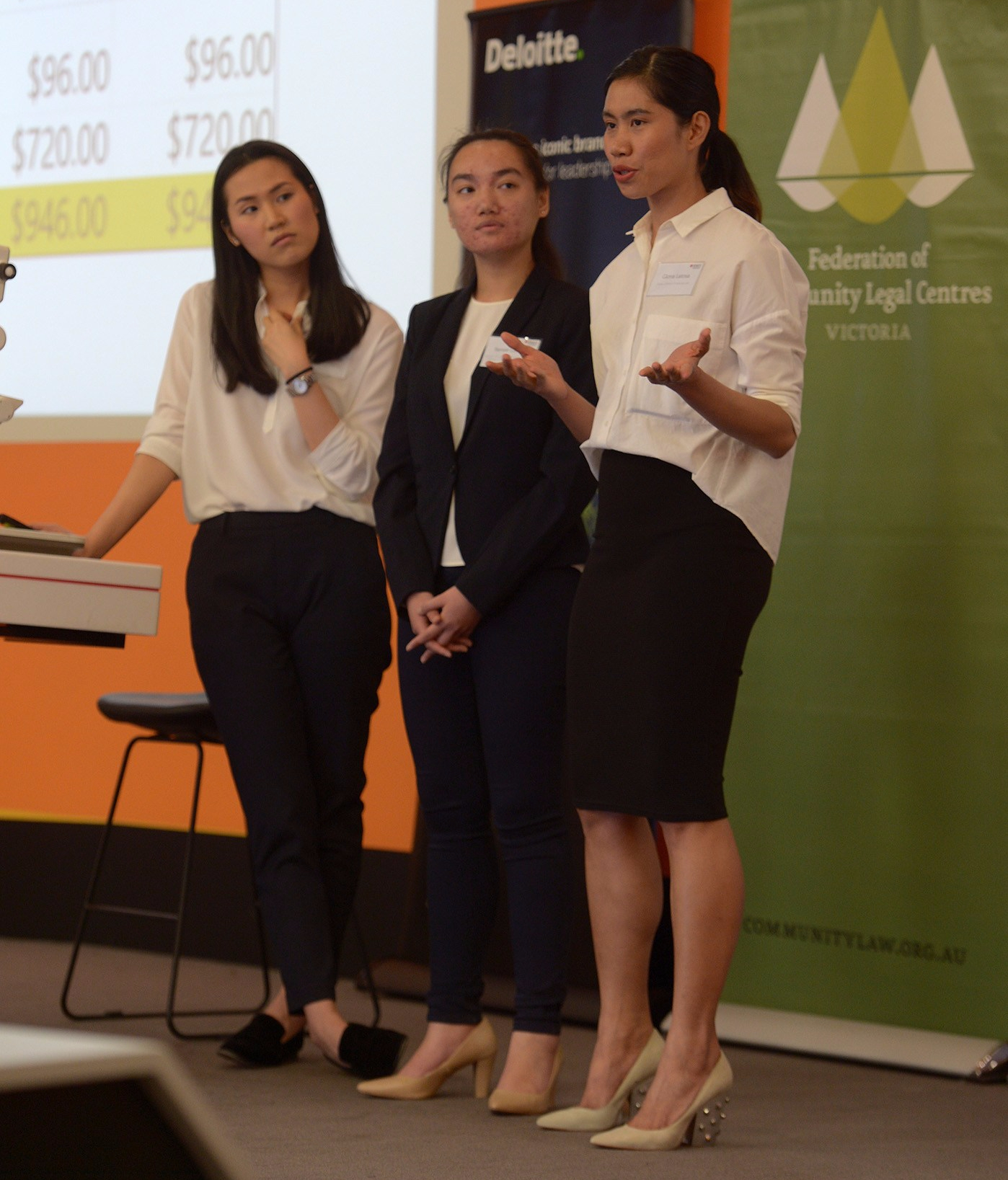
At a time when the Magistrates Court is developing a new $80 million integrated case management system over the next few years, these solutions not only provide powerful insights to the development of that system but low-costs solutions that can be quickly implemented at low cost in the interim. (Costings range from $5,000 to $160,000 over 2 years.)
Fitzroy Legal Service Volunteers
The LegalMate team of Adiwiri Satwika, Tatenda Mzondiwa and Georgia Ryan, believe that with their low-cost solution the Fitzroy Legal Service Night Service will be able to help an extra 720 people each year — a 20% increase. Faced with the challenge of helping the FLS to become more effective, the teams’ solution bring together changes in processes (including making them simpler) supported by a digital-based triage system. It includes starting the triage process earlier, so that consultations can begin as soon as volunteer lawyers and paralegals arrive, the creation of online forms, better targeting of clients’ needs to lawyers expertise and a change from a paper-based system to digital. They believe the changes will improve the volunteer experience and retention and provide data to help FLS identify the most frequently occurring problems, measure key performance indicators and make even stronger cases for funding.
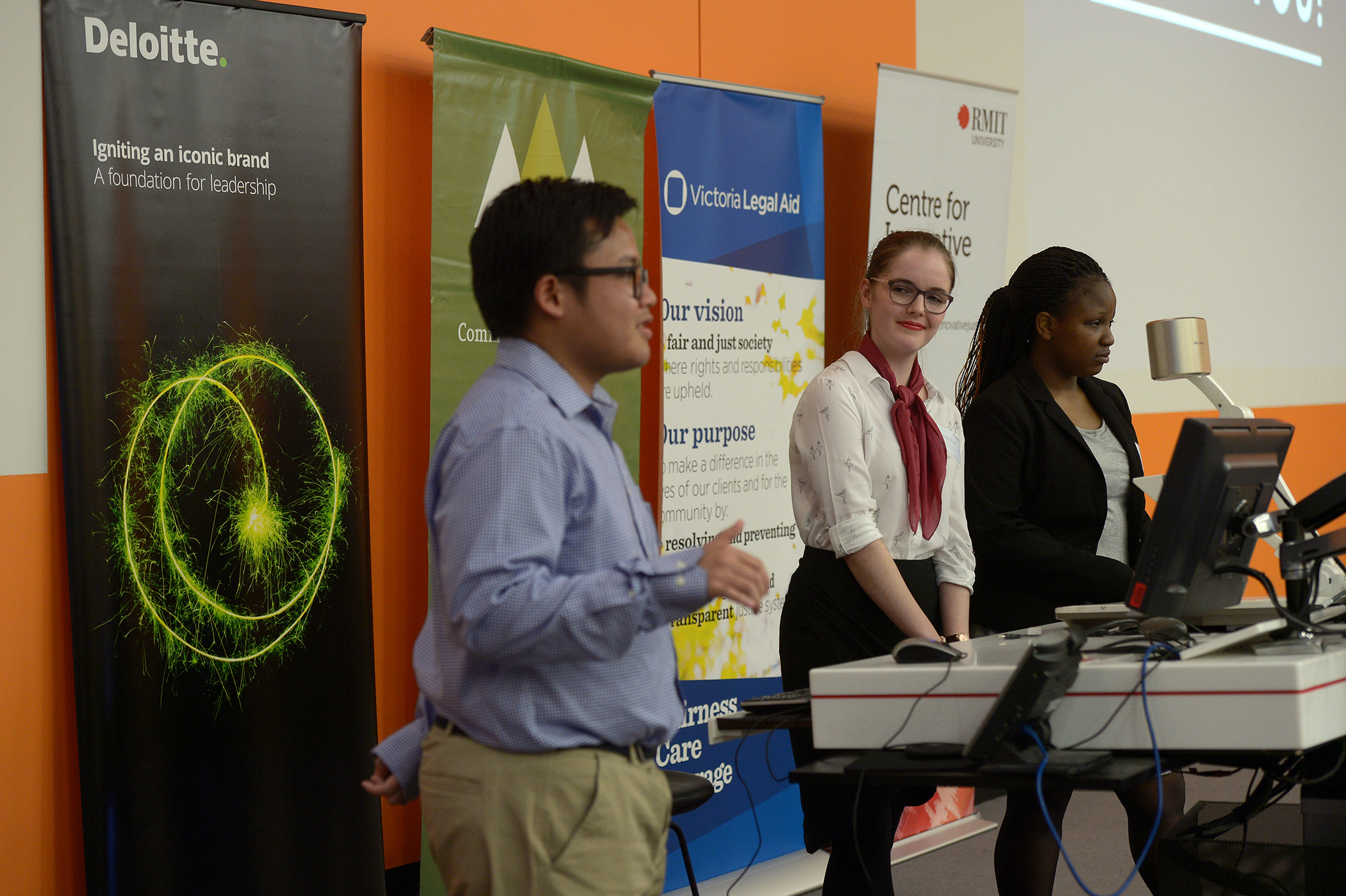
The MAPS solution developed by the team of Siobhan Tiernay, Shanice Nagy and Abhay Prasad complements the work of LegalMate and provides FLS with the opportunity to provide greater support for clients after their free legal advice session. Clients said they found that receiving advice could be overwhelming and stressful, especially if it was complex and difficult to understand. Having something that reminded them of the tasks they had to carry out would be a great help. My Action Plan or MAPS was the solution. MAPS is an online platform that clients will be able to access through a unique link. It means they can access the checklist of things they need to do to resolve their legal issues. MAPS will also integrate a link to FLS Law handbook and an SMS reminder function. The system will also allow FLS to view data sand analytics on the checklist progress and completion.

The strength of both of these solutions is that they offer insights and could also be taken up by other volunteer services, not just free legal services.
Ask Why?
When 42 per cent of men and 33 per cent of women in prison have an Acquired Brain Injury (ABI) compared to 2 per cent in the general population, the team of Georgie Abela, Ruth Harland and Sheney Varghese believe you have to Ask Why? Interestingly, the team’s solution to the challenge of over-representation did not involve technology. Instead it involved a major ‘redesign’ of our attitudes towards people with an ABI and of the services provided to support them. The team identified a critical gap in the forensic support services available for people with an ABI (or at risk of acquiring an ABI) as well as barriers to access to those services that did exist. The team developed a pilot for a new community-based organisation to address the forensic needs of those with an ABI, remove barriers to access, provide a consistent person in their life to support and care for them and help develop a supportive and stable friendship network in their community so that they feel included and able to make a positive contribution in their community. The team’s financial analysis argues that this approach not only improves the quality of life of those with an ABI, but will deliver considerable savings to the justice system.
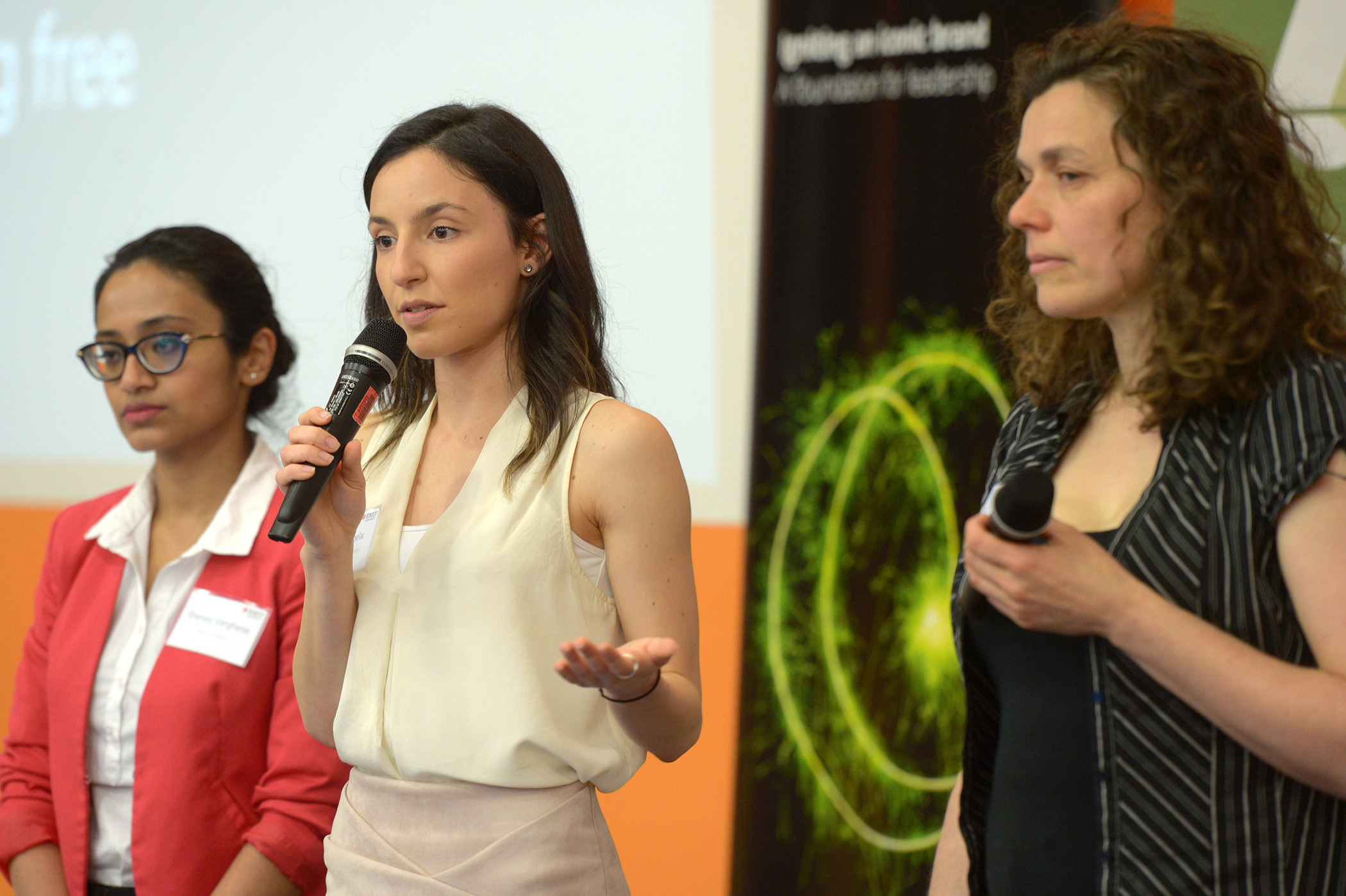
See the Fastrack innovators in action as they pitch their real-world solutions below
Thanks for your support!
The Access to Justice stream of the Fastrack program could not run without the support of many people and organisations, including ‘Chief Fastracker’, Associate Professor, David Gilbert and the Fastrack team, Professor Aaron Smith and Nikki Tucman, Fastrack co-founder, Peter Williams from Deloitte, Isobar, our partners Victoria Legal Aid and the Federation of Community Legal Centres, The Difference Incubator and Sheda and our fantastic team mentors: Staq/Ontrack (Magistrate Kate Hawkins, Jessica Kallinikos, Annika Dimitrijevic, Mark Sontag and Megan Anderson); Big Red Button/LiveCase (Jacob Torney, Elanor Peattie); LegalMate/MAPS (Claudia Fatone, Adrian Snodgrass) and AskWhy? (Jessica Richter, Anna Howard). So thanks!